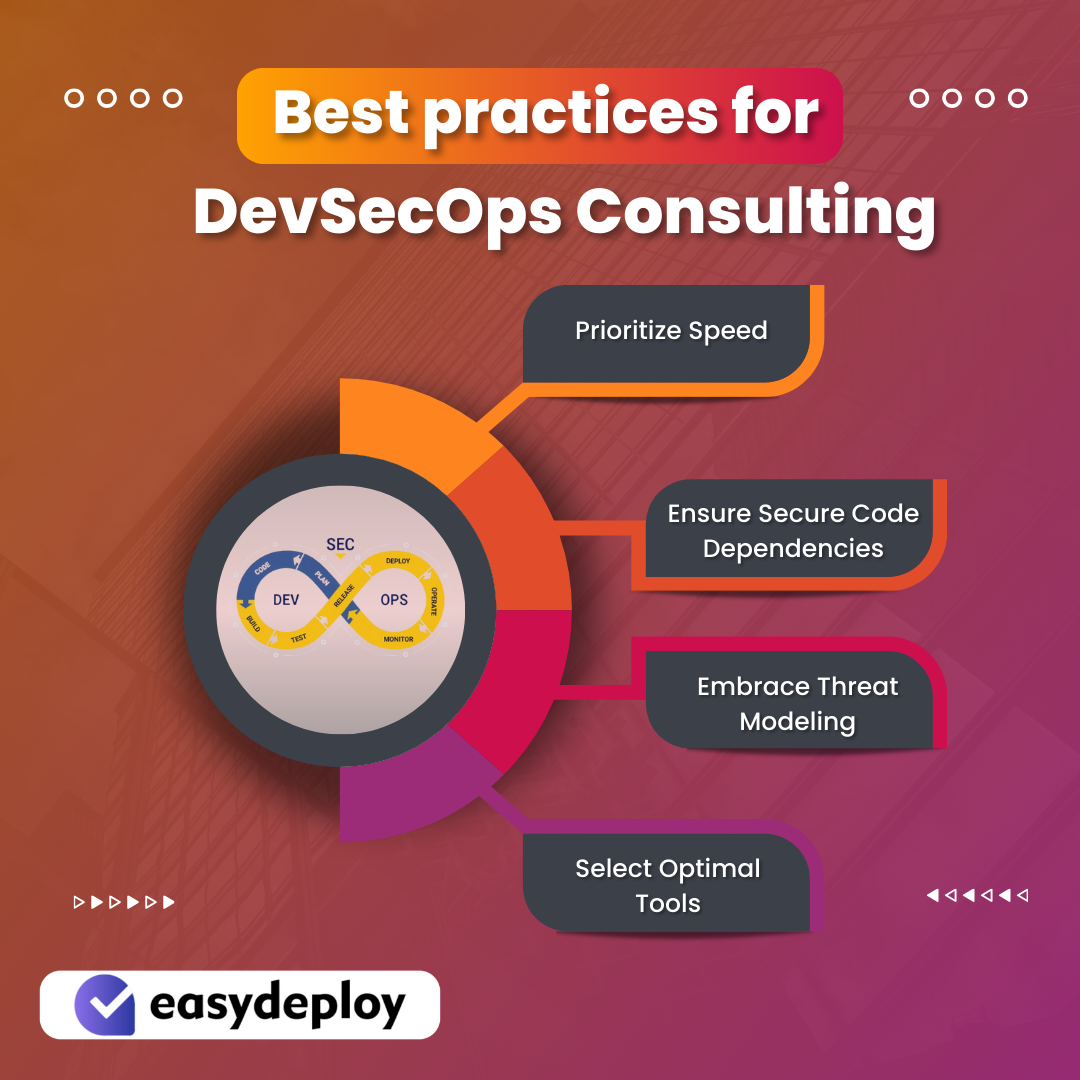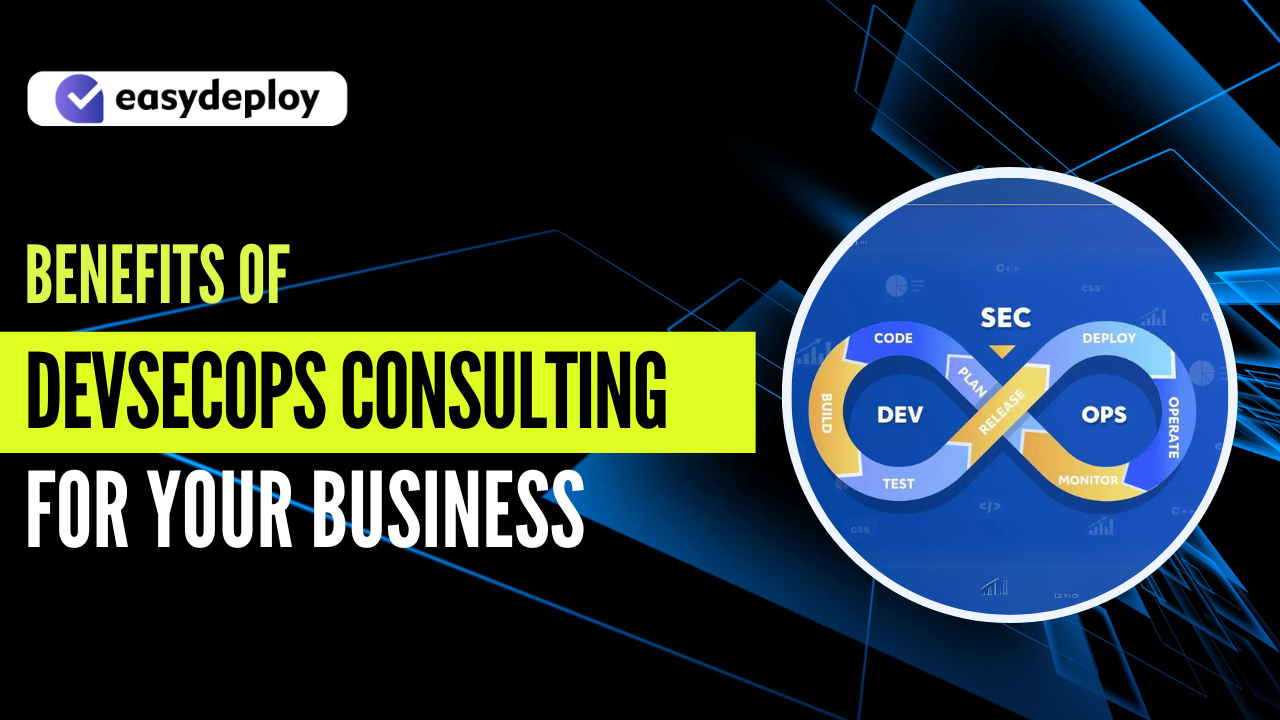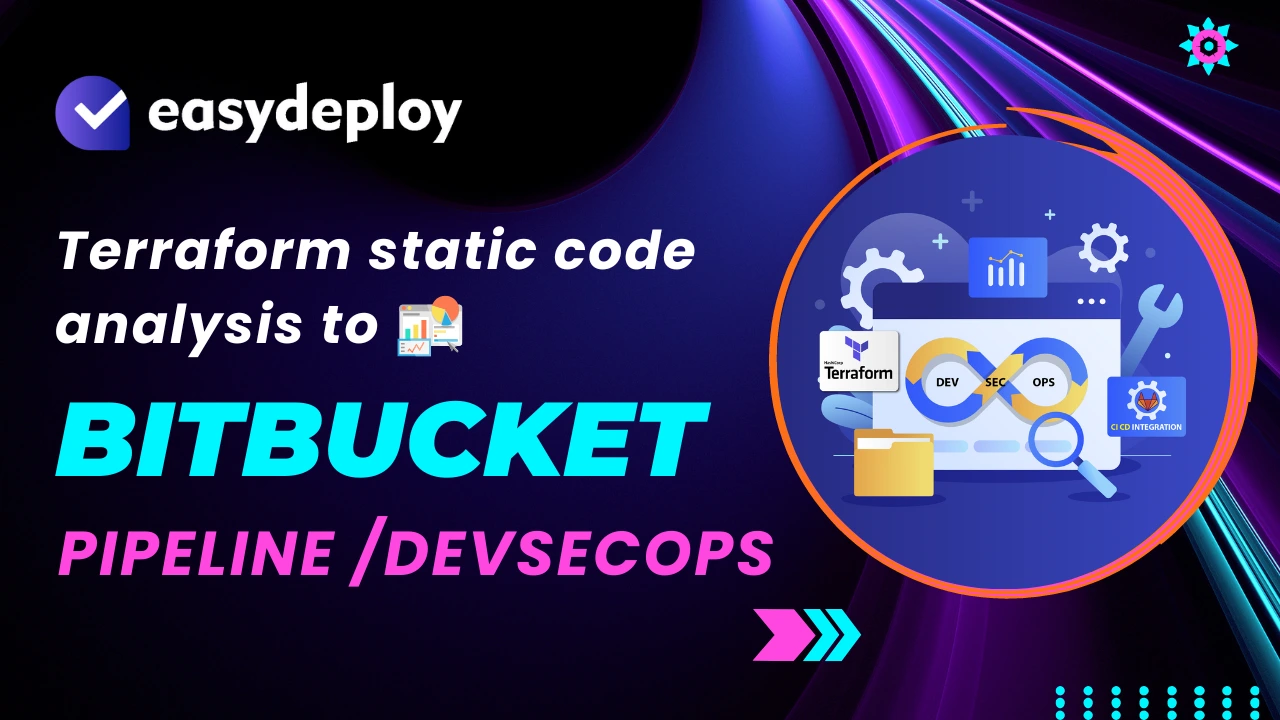DevSecOps builds upon the principles of DevOps, integrating security throughout the entire software development lifecycle, from planning and development to production and deployment.
Consulting on DevSecOps is crucial for grasping the intricacies of cloud security. Integrating security into DevOps primarily involves making minor adjustments to current automation tools and workflows.
In this article, we will look in detail at the importance of DevSecOps consulting for your business.
Let’s jump in!
What is DevSecOps?
In the software development process, security is considered as a paramount factor. But with the evolution of DevSecOps, things have turned out better. From the start of the software development life cycle (SDLC), you need to prioritize security to achieve smoother delivery of software.
With the help of DevSecOps consulting, you can ensure the security of the applications and infrastructure. It can minimize errors, vulnerabilities, and bugs.
Let’s delve into the core benefits of using DevSecOps by cultivating a security-centric culture:
- Integration: DevSecOps effortlessly combines application and infrastructure security within agile methodologies and DevOps workflows.
- Rapid Security Problem Resolution: Utilizing DevSecOps ensures swift identification and rectification of security concerns.
- Efficiency and Cost Benefits: Early detection and mitigation of security vulnerabilities in the SDLC through DevSecOps lead to both time and financial savings.
To end up with, embracing DevSecOps can safeguard the applications and infrastructure right from the beginning.
Overview of DevSecOps Consulting Services
DevSecOps consulting service merges development, security, and operations, weaving security measures into every step of software and web development. This approach resonates with DevOps principles, stressing teamwork, automation, and swift software deployment.
Delivered as a subscription through cloud computing, DevSecOps-as-a-service makes security a consistent element. It caters to companies of various scales, offering readily available solutions for instant integration.
DevSecOps vs. DevOps: Understanding the Difference
DevOps emphasizes enhanced teamwork between development and operations teams, aiming for swift software creation and maintenance.
DevSecOps builds upon this idea but integrates security as a core component from the outset, rather than treating it as an add-on later.
DevOps and DevSecOps are both ways to make software, but they have a main difference. DevOps is about making the software process smoother, while DevSecOps service adds a big focus on security right from the beginning. This means DevSecOps helps keep the software safe from potential issues and makes it easier to follow security rules.
Advantages of Adopting a DevSecOps Approach
DevOps is rooted in the collaborative efforts of development and operations teams, prioritizing rapid software creation and maintenance. However, with the emergence of DevSecOps, there’s a deliberate shift to embed security right from the inception of a project rather than as an afterthought. This proactive approach ensures that security considerations are woven into every stage of the software development lifecycle.
One of the standout benefits of DevSecOps is its commitment to robust security practices. Traditionally, security was often retrofitted into a project, leaving potential vulnerabilities. In contrast, DevSecOps integrates security measures from the outset, promoting a holistic and continuous approach to application safety. This proactive stance is further strengthened by the regular updates and evaluations throughout the software’s lifecycle, ensuring protection against the ever-evolving threat landscape.
Moreover, the DevSecOps paradigm fosters a collaborative and informed work environment. Teams are not siloed into their specialized roles but instead gain cross-functional knowledge, with both developers and operations personnel understanding and prioritizing security. This shared responsibility enhances accountability and ensures that security isn’t relegated to just a subset of specialists but is a collective concern.
Furthermore, the integration of automated security testing within DevSecOps is transformative. Automation streamlines routine security tasks, allowing teams to allocate resources more strategically. By leveraging automated tools, teams can swiftly identify and address potential security risks, ensuring that security remains at the forefront of the development process without impeding speed or efficiency.
In essence, DevSecOps reimagines the software development landscape by intertwining security, collaboration, and efficiency. By prioritizing security from the start and fostering a culture of shared responsibility, DevSecOps stands as a beacon for modern software development, ensuring both innovation and protection.
Why do you need DevSecOps Consulting?
Every firm adopted DevOps consulting service taking the transition to DevSecOps to apply all the innovative controls and capabilities to achieve a higher level of security. In return, developers face complex challenges and thus the team must incorporate security in an overall strategy to promote security awareness.
The deployment of DevSecOps helps to identify and resolve the issues via standardization of the process and automation. In addition, you can achieve complete control and availability of the DevOps environment based on the user requirements…
Successful adoption of DevSecOps helps in attaining the following benefits as follows:
- Maximize automation in the process.
- Follow the principles of the DevOps methodology.
- Ensure code is written with security in mind.
- Review existing security protocols and identify necessary improvements.
- Merge DevSecOps practices with security measures.
- Utilize relevant DevSecOps consultancy tools for better integration.
- Monitor Continuous Integration and Continuous Delivery processes.
- Evaluate the code and conduct vulnerability assessments.
- Mandatory security measures must always be in place.
What are the benefits of DevSecOps Consulting Services?
DevSecOps revolutionizes software development by emphasizing security throughout. Here are some of the benefits achieved within your business environment by the adoption of DevSecOps Consulting Services:
Boosted Security
DevSecOps teams consistently review, test, and refine code using automated tools, ensuring robust security without slowing down development. Any detected vulnerabilities are promptly addressed, emphasizing proactive defense.
Risk Reduction
With DevSecOps, the risk of security breaches diminishes. Automated tools swiftly identify and address common vulnerabilities, making product releases more predictable and secure.
Streamlined Compliance
DevSecOps ensures consistent security practices across the development cycle. Continuous monitoring guarantees ongoing compliance, simplifying audits and regulatory checks.
Efficiency Gains
By automating security protocols, DevSecOps lets developers concentrate on innovation rather than manual checks, speeding up the software development process while maintaining security.
Enhanced Collaboration
DevSecOps fosters collaboration among development, operations, and security teams, promoting a shared commitment to security and efficiency.
Quicker Market Entry
With automated security measures, DevSecOps accelerates product launches. This swift release cycle allows businesses to remain agile and responsive to market needs.
Elevated Quality
Early detection of vulnerabilities in the DevSecOps framework ensures the delivery of high-quality software, bolstering customer trust and satisfaction.
Cost Savings
By catching and addressing security issues early, DevSecOps reduces post-release expenses related to fixes and recovery efforts.
Clearer Insight
DevSecOps service offers a comprehensive view of security across the software lifecycle. Automation and analytics provide actionable insights, helping companies prioritize security strategies effectively.
Also Read: Terraform static code analysis to bitbucket pipeline | DevSecOps | easydeploy.io
DevSecOps Consulting Services’ best practices

Implementing DevSecOps can significantly enhance stability and boost productivity within your organization. Engaging with a DevSecOps consultancy can help you witness these operational improvements firsthand.
Prioritize Speed
In the realm of DevSecOps, velocity is of the essence. Achieving the desired pace is possible through automated deployment processes and robust code security. Given the paramount importance of security, it’s pivotal to embed all security protocols and assessments right from the initial stages of development.
Ensure Secure Code Dependencies
While code dependencies play a crucial role in software creation, it’s advisable to minimize reliance on third-party components. Embracing open-source elements can promote broader acceptance and implementation of DevSecOps methodologies.
Embrace Threat Modeling
Incorporating threat modeling within the DevSecOps service is vital for pinpointing potential risks. Before fully transitioning to DevSecOps, conducting a comprehensive threat modeling session can provide insights into vulnerabilities concerning your assets.
Select Optimal Tools
Effective Agile DevSecOps tools empower developers to deliver quality software punctually, ensuring client contentment. When weaving security into the DevOps continuum, the selection of top-tier security instruments becomes imperative.
DevSecOps Trends
Here are the DevSecOps Trends for you:
Boosting Security with ML and AI
As technology advances, combining machine learning (ML) and artificial intelligence (AI) with DevSecOps becomes crucial. Explore these modern approaches to enhance your security measures.
Advanced Predictions and Automated Detection
Embrace next-level security with smart automation, detailed anomaly spotting, and forward-thinking analytics. Utilizing ML and AI lets you take proactive steps, giving you an edge in security.
Tailoring DevSecOps for Today’s Systems
With the rise of cloud-based setups and containers, adapting DevSecOps to these new technologies is key. Integrate strong security features that offer both strength and flexibility. Be agile and protected.
Leading the Way, Not Just Adapting
In the ever-changing world of DevSecOps, set your own trends. Make your security approaches innovative and influential, setting standards for the future.
Challenges in deploying DevSecOps
Embarking on the DevSecOps journey presents unique hurdles and they are:
- Cultural Shifts: Transitioning to DevSecOps necessitates a change in how teams think and operate. Teams must understand their shared responsibility in upholding software security while also focusing on development. This might mean investing in training and fostering a culture that values best practices.
- Tool Integration Hurdles: Merging security tools seamlessly into the existing DevOps infrastructure isn’t straightforward. While increased automation and tight integration with CI/CD pipelines can streamline processes, simply replacing traditional tools with automated versions might not always be effective.
- Adapting to New Development Realities: With a surge in the use of open-source tools in modern software, traditional security solutions may struggle to identify vulnerabilities. Moreover, the rise of cloud-native apps operating in containerized environments adds another layer of intricacy.
- Addressing Vulnerabilities: According to Security Boulevard, organizations without DevSecOps have half of their apps vulnerable to attacks. In contrast, those with a strong DevSecOps approach see this number drop to 22%. Waiting until the end of the development cycle to test security often means developers have to go back and fix things late in the game, causing more work and delays.
- Speed vs. Safety in DevOps: DevOps is about moving fast, but that speed shouldn’t compromise security. All teams, including security, must be quick and adaptable. Old security methods can slow down the process and aren’t fit for the rapid pace of DevOps.
- Meeting Regulations and Audits: Staying compliant with ever-changing rules and passing regular audits is tough. Not following these standards can cost organizations money and harm their reputation. Keeping everything up to code in a fast-moving DevOps world presents its own set of challenges.
To navigate these obstacles with confidence, it’s essential to evolve your team dynamics, operational processes, and tooling in sync with the evolving nuances of DevSecOps service.
Conclusion
Many IT companies are quickly adopting DevSecOps consulting tools. If you want to move from a data job to a DevSecOps developer role, there are ways to bridge that gap.
DevSecOps developers often earn top salaries compared to other tech roles. Engage with a DevSecOps consultancy to tap into unmatched insights that address the complexities of integration, ensuring the best outcomes for your enterprise.
Getting guidance from DevSecOps consultants can help you land well-paying jobs in the future, just like how DevOps, Cloud, and Security roles are in demand now.





